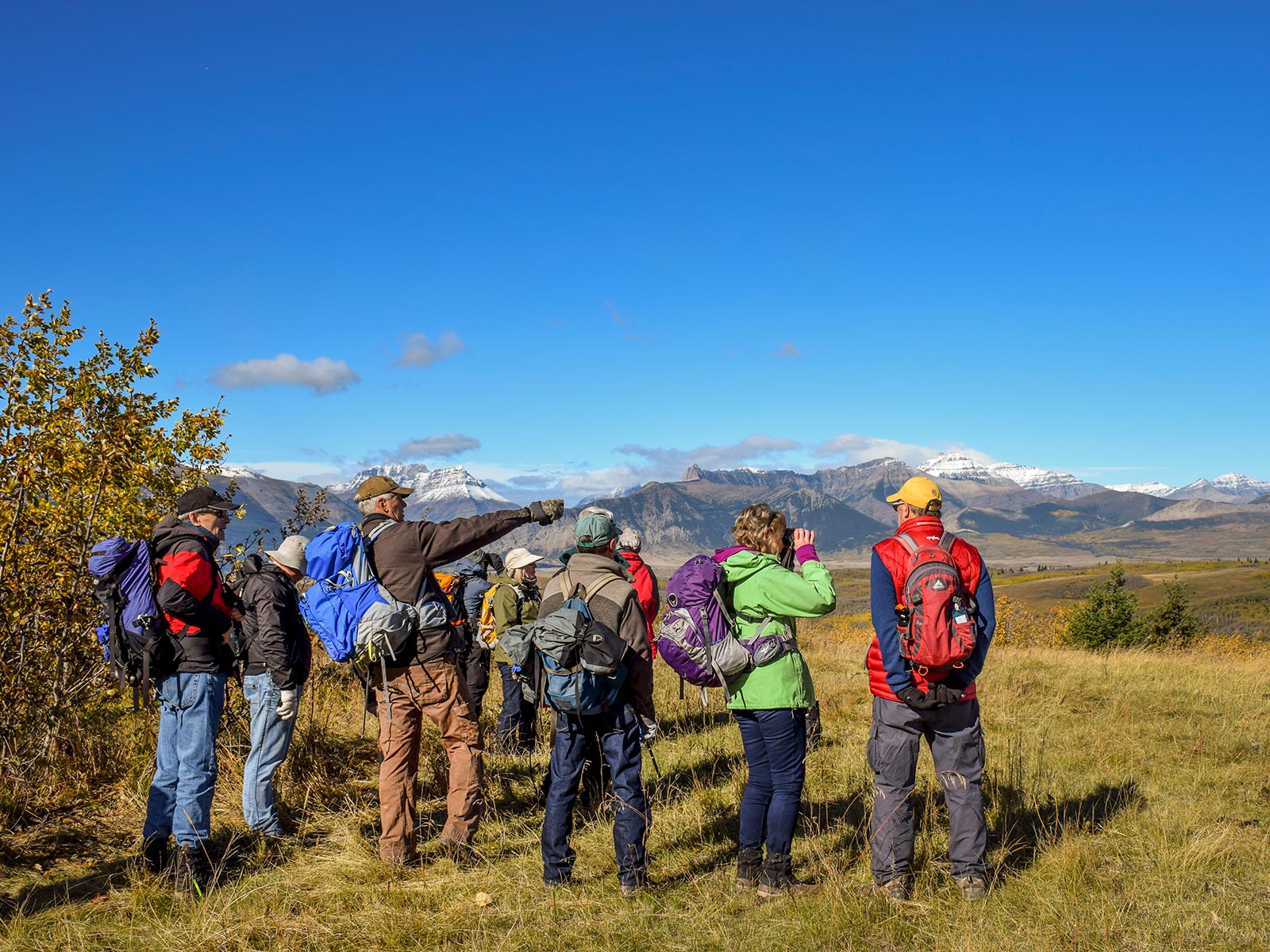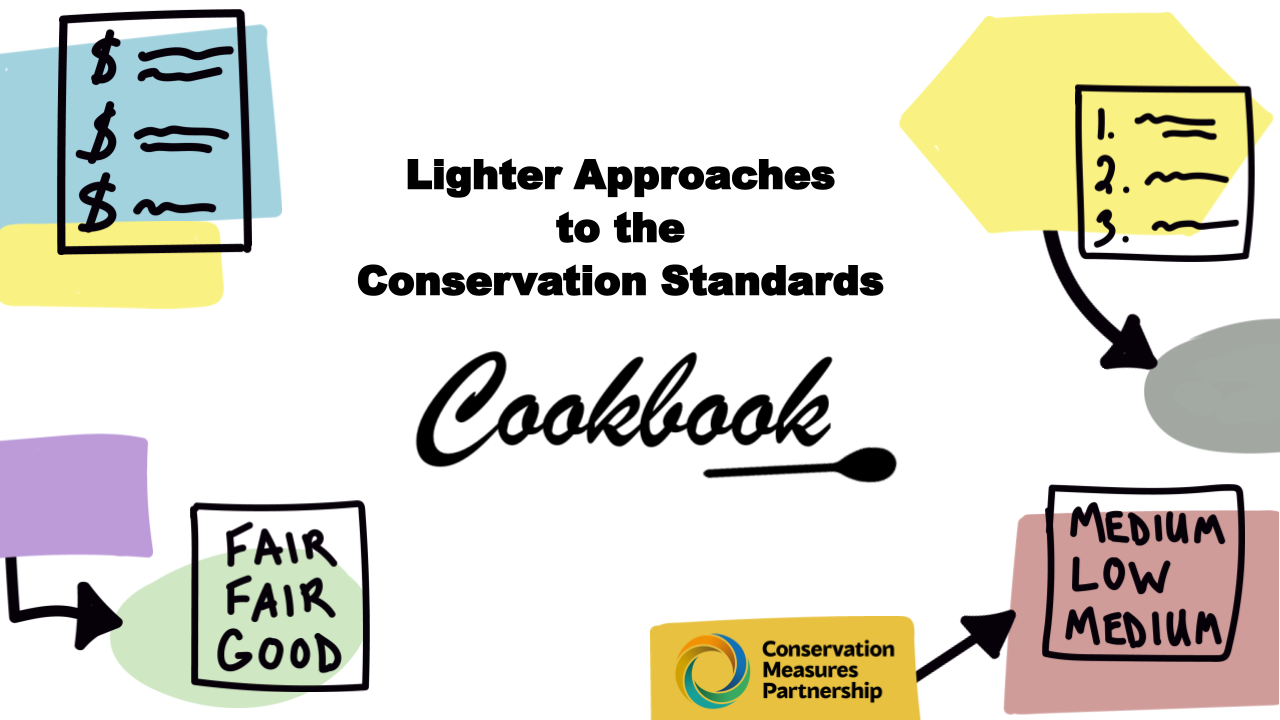Photo Credit: Peter Chira
Flagship Products

Photo Credit: Justin Grubb
The Conservation Standards
The Conservation Standards is the product of inputs, field tests, and discussions among members of the Conservation Measures Partnership (CMP), which has final editorial authority over the Conservation Standards. Substantial input was also provided by members of the Conservation Coaches Network (CCNet) and other CMP partners. Explore the newly launched Conservation Standards version 5.0 here!
Actions Classification
This classification is designed to provide a simple, hierarchical, comprehensive, consistent, expandable, exclusive and scalable classification of all conservation actions.

Photo Credit: Justin Grubb

Photo Credit: Justin Grubb
Threats Classification
This classification is designed to provide a simple, hierarchical, comprehensive, consistent, expandable, exclusive and scalable classification of all conservation threats.
Lighter CS Cookbook
CMP’s flagship product, the Open Standards for the Practice of Conservation (Conservation Standards for short) is a set of widely used standards that offer a rich and rigorous approach to project management. But, sometimes teams don’t have the time, money, or support to undertake all steps to the ideal level. If you find yourself in this situation, check out this draft “Cookbook” for Lighter Approaches to the Conservation Standards!
Initiatives
Innovation within CMP happens through our initiatives, guided by the dedication, expertise, and collective wisdom of our members. Explore below to learn about these initiatives and browse member videos and presentations from working sessions and retreats.
This group aims to develop guidance for integrating climate change into the Conservation Standards process.
This overall initiative aims to distill existing knowledge and develop guiding principles around key topics by harnessing the collective knowledge and expertise of the conservation community. Current initiatives can be found on the CMP workspace.
The Conservation Actions and Measures Library (CAML) is an open-source library of Miradi results chains for the most common conservation actions.
The Conservation Audit Tool is used to analyze strengths and weaknesses in conservation programs against the Conservation Standards and define what changes are needed to adapt management for better outcomes.
This initiative aims to provide support, guidance material, tools, and system improvements to key individuals aiming to improve conservation planning practices within their organization.
The Conservation Effectiveness group aims to investigate what evidence exists to verify that increased adoption of “good” conservation practice leads to more successful conservation projects.
Marketing and promotion of CS within organizations and to broader audiences. Includes work on framing adaptive management message and training materials.
Creating training materials for 1. CS practitioners to use to train others; and 2. Conservationists who are interested in learning more about the CS through course materials.
The focus of this initiative is on what equity might look like in the CS community. 2 major pathways – 1) Guidance, CS, bringing equity into technical conversations; 2) Ensuring more equity in CMP representation.
Build a community of practice to test several ways to encourage teams and organizations to value failure, learn from failure and change behavior to improve conservation practice.
The Guidance Review Committee was formed in early 2014 by CMP and CCNet representatives to help conservation practitioners find the most appropriate CS guidance to meet their needs.
This initiative helps address a need to better reflect human wellbeing concerns within the CS. Over the years, the committee has developed protocols, guidance, and examples for showing how conservation contributes to / affects human wellbeing in a CS framework.
The Lighter CS Initiative answers long-standing community requests for lighter, more accessible ways to get involved with the Conservation Standards.
This initiative works on continuing to update and improve Miradi and MiradiShare conservation planning software, which is used to diagram the CS process.
The Nature-based Solutions learning initiative aims to understand the value of a Nature-based Solutions approach for achieving cost effective benefits for biodiversity, climate, and society.
Including the Global Environment and Development Agendas group, this initiative looks at how the CS can be used when engaging in policy in multiple contexts.
The Spatial CS initiative is developing protocols and examples for incorporating spatial data into Conservation Standards work.
These initiatives have been deemed completed and their final products can be found on the CMP workspace.
Photo Credit: Gregoire Dubois
Retreats and Technical Meetings

Photo Credit: Brenda Van Sleeuwen
Every other year, CMP hosts in-person members’ meetings to share experiences, challenges, and innovations and to advance new and ongoing work. Click here to learn more.
Meeting Notes and Materials
2025 (March): Hotel Dreams Valdivia (Valdivia, Chile)
- 2025 Rally Website *This will be a joint CCNet and CMP Rally
2023 (October): Capon Springs & Farms (West Virginia)
2019 (May): Shenandoah National Park (Virginia)
2017 (January): Yulee, FL (White Oak Conservation Center)
2014 (October): Washington, DC (WWF US)
2010 and 2011: Measures Summits
Support CMP
CMP is a partnership of conservation-oriented NGOs, government agencies, and funders that works collectively to achieve greater impact. We seek better ways to design, manage, and measure the impacts of our conservation actions so that we can learn and improve our efforts and contribute our learning to the broader evidence base.
Photo Credit: Jason Houston for USAID
Download CS
The Conservation Standards is the product of inputs, field tests, and discussions among members of the Conservation Measures Partnership (CMP), which has final editorial authority over the Conservation Standards. Substantial input was also provided by members of the Conservation Coaches Network (CCNet) and other CMP partners.
Photo Credit: Felix Cybulla
Our Collaborators
Every organization, agency, project, and individual has its own preferred set of terms. There is no right answer – the most important thing is that the members of your project team and the people with whom you work have a clear and common understanding of whatever terms you choose to use.
Photo Credit: Chris Scarffe
Contact CMP
To inquire about supporting The Conservation Measures Partnership (CMP) or for general inquiries, please contact us at CMPinfo@ConservationMeasures.org
Photo Credit: Felix Cybulla

